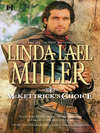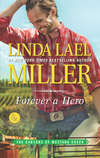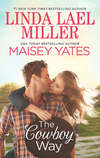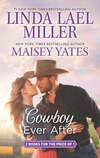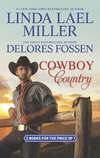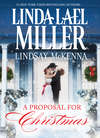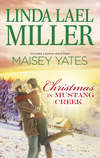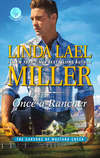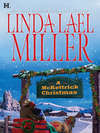Читать книгу: «McKettrick's Choice», страница 2
CHAPTER 3
“LORELEI,” JUDGE FELLOWS SAID, leaning forward in the chair behind the desk in his study, “be reasonable. I’ve spent a fortune on this wedding. There are guests in every hotel room in town. The food can’t be sent back. And Creighton is a good man—he can’t be blamed for wanting to make the most of his last hours of freedom.”
Lorelei flushed with indignation. It was like her father to take Creighton Bannings’s part, not to mention bemoaning the money he’d spent to make his daughter’s ceremony the grandest spectacle Texas had ever seen. “I will not marry that reprehensible scoundrel,” she said flatly. “Not today, not tomorrow, not ever. Not if all the angels in heaven come down and beg me to forgive and forget!”
The judge sighed a martyr’s sigh, but his eyes were canny, taking her measure. Creighton Bannings was a lawyer, and a wealthy man in his own right. He had powerful connections in Austin, as well as Washington. He was, in short, the proverbial good catch—and a fish her father would not willingly let off the hook.
“Must I remind you, my dear, that you’ll be thirty next month? You’re a beautiful woman, and you have a good mind, but you’ve been on the shelf for a good long while, and with your disposition…”
Lorelei, leaning against the thick door of the study, stiffened. Glancing at her reflection in the glass of the tall gun cabinet behind her father’s desk, she took a distracted inventory. Dark hair, upswept. A long neck. Blue eyes, high cheekbones, a slender but womanly figure. Yes, she supposed she could be called beautiful, but the knowledge gave her no satisfaction. It hadn’t been enough to keep her fiancé from straying, had it?
“What’s wrong with my disposition?” she demanded, after relaxing her clenched jaw by force of will.
The judge arched his bushy white eyebrows, ran a hand over his balding pate. “Please, Lorelei,” he said, with a mild note of disdain. “Do you think I haven’t heard that you burned your wedding dress—which cost plenty, mind you, coming all the way from that fancy place in Dallas like it did—in front of the whole city of San Antonio? Was that the act of a sensible, gracious, sweet-tempered woman?”
“It was the act,” Lorelei said pointedly, “of a woman who just found her intended husband in bed with a housemaid on her wedding day!”
“I’m sure Creighton could explain everything to your satisfaction, if you would only give him the chance.”
Lorelei rolled her eyes. “What excuse could he possibly give? I saw him with another woman!”
The judge tried again, saturating his words with saintly patience. “A man of Creighton’s sophistication—”
“To hell with sophistication!” Lorelei burst out. “What about loyalty, Father? What about common decency? How can you expect me to bind myself to a man who would betray me so brazenly on our wedding day—or any other?”
Her father sat back in his chair, tenting his chubby fingers under his chin. She’d seen that expression on his face a hundred times—in a courtroom, it meant a death sentence was about to be handed down. “Do you know what I think, Lorelei? I think you want to be a spinster. How many suitors have you rejected in the last ten years?”
Sudden tears throbbed behind Lorelei’s eyes, but she would not shed them. Not in her father’s presence. She braced herself for what she knew was coming and held her tongue. He wasn’t expecting an answer anyway, and wouldn’t leave space for one.
“Michael Chandler has been in his grave for almost a decade,” he said. “It’s time you stopped waiting for him to come back.”
One tear escaped and trickled down Lorelei’s over-heated cheek. Dropped to her bodice. “You hated Michael,” she whispered. “You were relieved that he died.”
“He was weak,” the judge said, quietly relentless. “You would have tired of him within a year and come weeping to me to get you out of the marriage.”
“When,” Lorelei countered, “have I ever ‘come weeping’ to you over anything?”
A muscle twitched in the judge’s jaw. “Creighton is your chance to have a home of your own, and a family. I know you want those things. If you persist in this—this tantrum of yours, you will be alone for the rest of your life.”
A chill quivered in the pit of Lorelei’s stomach. “Better alone, with my self-respect intact, than alone in a marriage with a man who doesn’t love me enough to be faithful.”
The judge gave a derisive snort. “Love? Come now, Lorelei. You aren’t a stupid woman. Love is for story-books and road-show melodramas. Marriage is an alliance, and sentiment has no place in it. Pull yourself together. Put on one of your ball gowns and let’s get on with this.”
Lorelei shook her head, momentarily unable to speak.
“Then I guess I have no choice,” the judge said, with a dolorous shake of his own head. “If you persist in this foolishness, I will have to send you away. Perhaps even to an asylum.” He frowned, studying her pensively. “I fear you are not quite sane.”
Lorelei’s knees threatened to give out. Though she’d never heard this particular threat before, she knew it wasn’t an idle one. Her father had the power and the means to lock her up in some sanitarium; it would be a matter of signing a few documents. He’d sent Jim Mason’s troublesome wife off to one of those places with the air of a man doing a simple favor for a friend, and there had been others, too.
“I see I’ve gotten your attention,” the judge said, a gleam of satisfaction in his eyes. Then, more gently, he added, “Go to Creighton now. Make things right. I shall expect you at the church at six o’clock, as planned, ready to go through with the wedding.”
Lorelei pushed away from the door, stiffening her spine once again. “Then you will be disappointed,” she said calmly. She turned the knob, pulled the great panel open.
“If you step over that threshold,” her father warned, “there will be no turning back. Just remember that.”
Lorelei hesitated a moment, then rushed out. She was so intent on packing her things and laying plans to escape before the judge sent her away to some madhouse that she didn’t see the man standing in the entryway until she collided with him.
“Lorelei!” her father roared, from inside his study.
“Looks like I came at a bad time,” said Holt Cavanagh.
HOLT STEADIED the hellcat by gripping her slender shoulders in his hands. She’d changed clothes since their encounter, as he had, but her ebony hair still smelled faintly of burning wedding dress.
“Holt McKettrick,” he said by way of introduction when she looked up at him, blinking cornflower-blue eyes in a vain effort to hide a sheen of tears. Her lashes were thick, even darker than her hair, and her lips…
Well, never mind her lips.
“I thought your name was Cavanagh,” she said.
“I didn’t say that, Gabe did. I went by it once.”
She raised a finely shaped eyebrow. “Neither here nor there,” she said crisply. Then, in a demanding tone of voice, “What do you want?”
She didn’t try to pull away, though. Nor, he reflected, with detached interest, was he particularly interested in releasing her. Curious, he thought.
“Actually,” Holt said, reluctantly letting his hands fall to his sides, “I came to see your father.”
“God help you,” Lorelei said, and, pushing past him, rushed up the broad, curving stairway.
This, Holt thought idly, was some hacienda.
“I don’t believe I’ve made your acquaintance, Mr. McKettrick,” observed a masculine voice from somewhere on Holt’s right. “Are you a friend of my daughter’s? If so, perhaps you can reason with her.”
Judge Fellows stood in the doorway of what was probably his office. He was around sixty, with shrewd eyes, mutton-chop whiskers and a well-fitted suit. Somewhere upstairs a door slammed, and Fellows flinched.
Holt didn’t bother to put out his hand. “I never met your daughter before today,” he said forthrightly. “I’m here about Gabe Navarro.”
Fellows’s mouth tightened. “The Indian.”
Holt did some tightening of his own, but it was all inside, out of the judge’s sight. “The Texas Ranger,” he said.
The other man shrugged. “I’m afraid Mr. Navarro’s past glories, whatever they might be, were rendered meaningless by the murder of a settler and his wife. He butchered them with a Bowie knife and then stole their horses.”
“He didn’t kill anybody,” Holt maintained. “Or steal any horses.”
“You’re entitled to your opinion, Mr. McKettrick,” Fellows said, with false regret. “However, as I said, your friend has determined his own fate. The knife used to cut those poor souls to ribbons was his, and the horses were found penned up outside that lean-to he calls a home.”
Holt didn’t bother to argue. He knew conviction when he butted heads with it. Evidently, Judge Fellows was as unreasonable and ill-tempered as his daughter. “Who represented him? During the trial, I mean?”
“Creighton Bannings,” the judge said, nodding toward the front walk, visible through the long leaded-glass window beside the front door. “Here he is now.”
Holt turned, frowning thoughtfully. Bannings. Where had he heard that name before? The answer tugged at the edge of his mind, staying just out of reach.
There was a brief, obligatory knock, then Bannings strolled in, fidgeting with his tie. He was tall, as tall as Holt, but leaner, and his clothes, though expensive, were rumpled. The face, fine-boned and too pretty, was as familiar as the name, but Holt still couldn’t place the man.
“Holt McKettrick,” Holt said.
“I remember you as Cavanagh,” Bannings replied. He put out a hand, hail fellow well met, and Holt hesitated a moment before shaking it.
“I guess I ought to remember you, too,” Holt allowed, “but I can’t say as I do.”
Bannings smiled, showing white but crooked teeth. “We got into a fight once, at a dance, over a girl. I believe we were sixteen or seventeen at the time. John Cavanagh hauled you off me by the scruff of your neck.”
It all came back to Holt then, clear as high-country creek water. So did the enmity he’d felt that night, when he’d found Mary Sue Kenton crying behind her pa’s buckboard because Bannings, down from Austin to visit his country cousins, had torn her sky-blue party dress.
Holt felt a rush of primitive satisfaction, recalling the punch he’d landed in the middle of Bannings’s smug face five minutes after he’d turned Mary Sue over to the care of a rancher’s wife. For a reason he couldn’t define, he glanced toward the stairs, where he’d last seen Lorelei.
“I understand you defended Gabe Navarro,” he said, after wrenching his brain back to the business at hand.
Bannings grimaced, resigned. “I fear I wasn’t successful,” he admitted.
Holt’s gaze strayed to the judge, shot back to Bannings. “You a friend of the family?” he asked.
“I’m about to marry the judge’s daughter, Lorelei,” Bannings said.
Holt gave him credit for confidence. “Given the fact that she set fire to her wedding dress in a public square this afternoon,” he ventured, “it would seem there’s been a change in plans.”
Bannings looked pained, but the expression in his eyes was watchful. “Lorelei has a temper,” he admitted. “But she’ll come around.”
Having been a witness to the burning of all that lace and silk, Holt had his doubts, but he hadn’t come here to discuss what he considered a private matter. “Gabe Navarro,” he said, “is an old friend of mine. We were Rangers together. He’s innocent, and he’s being treated like a dog. Just now, I’m wondering why you didn’t file an appeal.”
“How do you know I didn’t?”
“I read the paperwork over at the courthouse,” Holt said. “Along with the clerk’s notes. Seems to me, you didn’t put up much of an argument.”
Bannings glanced questioningly at the judge, which confirmed a few suspicions on Holt’s part. Gabe’s trial had been a monkey show, as sorry as the case against him.
“I did my best,” Bannings said, a little defensively.
“I’m thinking your best is pretty sorry,” Holt replied.
Bannings flushed. Holt suspected the lawyer would have liked to land a haymaker, but apparently his memory was better than his ethics. He clearly remembered the set-to over Mary Sue and her torn dress well enough to think better of the idea, which showed he was prudent, as well as spineless.
“Navarro was tried and found guilty,” Fellows put in. “He won’t be missed around here.”
Holt set his back teeth, pulled hard on the reins of his temper. Gabe was behind bars, and if he, Holt, got Fellows’s back up, Gabe would suffer for it. He’d sent a wire to the governor after leaving the courthouse, but there was no telling how long it would be before he got an answer.
“I won’t take up any more of your time,” he said.
The judge nodded.
Holt reclaimed his hat from its hook on the coat tree, where the maid had hung it after admitting him, and opened the door. There were still several hours of daylight left; he could reach the Cavanagh ranch before sunset if he rode hard. In the morning, he would return to San Antonio, look in on Gabe and find a lawyer with some backbone.
Deep in these thoughts, he was taken by surprise when Bannings followed him onto the porch.
“Leave this alone,” the lawyer said, in an anxious whisper, after glancing back at the closed door. He must have seen the judge looking out at him through that long window, because he paled a little. “You’ve got no idea what kind of man you’re dealing with.”
“Neither have you,” Holt said, and kept walking.
CHAPTER 4
GABE FIGURED he must be hallucinating. Roy, the jailer, was standing just on the other side of the cell doors with a covered tray in his hands, and the savory smells coming from under that checkered dish towel made Gabe’s mouth water and his belly rumble.
He sat up, blinking, and swung his legs over the edge of the cot.
Grumbling, the jailer set the food down on the floor and fumbled with his keys. Not for the first time, Gabe considered overpowering him—which would be easy—and taking his chances getting past the guards outside—which would not be so easy. He’d most likely get himself gut-shot if he tried.
“That friend of yours must have himself quite a bank account,” Roy muttered, pushing the door open cautiously and shoving the tray inside with his foot. “That there’s a fancy dinner from over the hotel.”
Roy slammed the cell door shut and locked it, while Gabe went for the grub. “I’ll be damned,” he murmured, crouching to toss back the dish towel. It was beef all right, and prime rib to boot. There were potatoes, a mountain of them, swimming in gravy, and green beans cooked up with bacon and onion.
The blood drained from Gabe’s head.
Roy tarried. “I wouldn’t have figured you had a friend,” he said.
Gabe sat on the side of the cot, the tray of food in his lap. His hand shook as he took up a fork. “What are you having for supper tonight, Roy?” he asked.
“What I’m having for supper ain’t none of your never-mind,” Roy said, but he still didn’t seem to be in any hurry to go on about his business. Maybe he was sucking in the smell of that feast.
Gabe cut off a chunk of beef with the side of his fork. Tender as stewed cloud. He damn near swooned when he took that first bite.
“Who is that feller, anyhow?” Roy persisted.
“Ain’t none of your never-mind,” Gabe answered with his mouth full.
“You’re pretty cocky for somebody about to be strung up.”
Gabe was busy savoring a second forkful of prime rib, so he didn’t bite on the gibe. His stomach seized on the food, growled for more.
“Hope you ain’t thinkin’ he can get you out of here. Nobody could do that, short of the governor.”
The mashed potatoes were as good as the beef, and the gravy—well, it was fare fit for angels. “You’d better get yourself ready for some real trouble,” Gabe said, chewing. “Holt Cavanagh, he’s like a freight train when he sets his mind on something. If I were you, I’d stay off the tracks.”
Roy paled, which gave Gabe almost as much satisfaction as the food. “Cavanagh? Same name as that rancher, the one who’s been tanglin’ with the Templeton bunch?”
Gabe smiled, though the mention of the name Templeton made all his old injuries take to aching again. “Same name,” he said.
“They can’t be related,” Roy fretted.
Gabe forked up some beans and a big hunk of bacon.
“Can’t they?”
JOHN CAVANAGH’S old heart nearly stopped when he looked up and saw the rider at the edge of the hayfield, with the last rays of the setting sun framing man and horse. He rubbed his stubbly chin, leaning on the long-handled scythe, and squinted into the glare.
Tillie, working beside him, let her scythe fall into the grass. “That’s Holt,” she whispered, and began to run, fairly tripping on the hem of her calico skirt. She fell once, got up again and went right on running.
It couldn’t be Holt, John thought. He was up in the Arizona Territory, helping to run the family ranch and raising up a daughter.
The rider swung down from the saddle as Tillie barreled toward him, and held his arms out wide. Tillie gave a shout of joy and flung herself into them.
God in heaven. It was Holt.
John let his own scythe fall, though he was not a man to be careless with tools, and hurried toward the pair, moving as fast as his rheumatism would allow.
Holt swung Tillie around in a circle and planted a smacking kiss on her forehead. She was laughing and crying, both at once, and hugging Holt’s neck as if she’d drown if he let her go.
“Holt,” John said, drawing up at the edge of the field and fair choking on the word.
The familiar grin flashed. “Yes, sir. It’s me, all right.”
John took a step toward him, still disbelieving. His vision blurred, and his throat closed up so tight he couldn’t have swallowed a hayseed, even with good whiskey to wash it down.
Holt stroked Tillie’s back; she still hadn’t turned loose of his neck. “I see my little sister is all grown-up,” he said.
Hope swelled up inside John Cavanagh, hope such as he hadn’t felt in a year of Sundays. “You figurin’ on stayin’?” he asked, and ran an arm across his mouth.
“Until you run me off,” Holt replied, and grinned again.
“Go ahead and hug him, Pa,” Tillie said joyously. “It’s the only way you’ll believe he’s real.”
John took another step, stumbling a little, and put his arms around the man he still thought of as his son. The two of them clung for a moment, and John felt tears on his old black face.
“Come on inside,” he managed when they drew apart again. “With you here, Tillie’s like to cook up a storm.”
Holt was looking around the place, taking in the sagging barn, the downed fences, the skinny cattle and slat-ribbed horses.
If John hadn’t been so damn glad to see the boy, he might have felt shame. Time enough later on to answer all those questions he saw brewing in Holt’s face. Tell him how Templeton and the bankers were trying to force him out.
Right now, there were more important things to be said.
“You bring me a picture of that little girl of yours?” John demanded, hobbling along between Holt and Tillie as the three of them made for the house.
Holt took a wallet from his inside pocket and pulled out a daguerreotype.
John snatched it from his hand and paused, right in the middle of the path, to have himself a look. “She’s the image of Olivia,” he said, just before his throat closed up again.
“Let me see,” Tillie pleaded. “Let me see!”
Reluctantly, John handed over the likeness.
Tillie gave a little cry, drinking in the image with her eyes. “You should have brought her,” she wailed. “Why didn’t you bring her?”
Holt laid a gentle hand on Tillie’s shoulder. She was twenty-eight years old, but simple-minded as a child. Something to do with the troubles her mother had bringing her into the world.
“It’s too far,” Holt said quietly. “And she’s going to school.” He glanced toward his horse, grazing happily in the good Texas grass. At least they still had the grass. “I brought you something, though. It’s in my saddlebags—left-hand side.”
Tillie picked up her skirts and ran for the gelding, supper forgotten, for the moment at least.
“Frank Corrales sent me a letter,” Holt said, watching as Tillie unbuckled the saddlebag and plunged an eager hand inside. “Said somebody was trying to force you off your land. Looks like he knew what he was talking about.”
Tillie pulled out a doll with long dark ringlets and skin the same coffee color as her own.
“Where the devil did you find a colored doll?” John asked.
“Bought it along the way,” Holt said, watching fondly as Tillie hugged the doll to her flat chest and danced around in a circle. In the next instant, he looked somber again. “Who’s after the land, John? Gabe told me his version, but I want to hear it from you.”
John rubbed his chin. Once Holt got his mind around something, there was no getting it loose. “Man named Templeton. His place borders this one, and he wants the grass for his fancy English cattle.” Tears welled in John’s eyes as he watched Tillie. Where would they go, if they left this ranch?
Four of John’s children were buried here, and so was Ella, his angel of a wife. There’d been as much blood and sweat fall on the land as rain, and more than a few tears, too.
“The banker’s his friend,” John went on, when he could. “They called my loans. Tried to cut off my water supply, too. Even rustled some of my cattle, though I can’t prove it.”
Holt laid a hand on John’s back. He didn’t speak, but he didn’t need to. John knew his intentions well enough.
“You can’t fight them, Holt,” John said, because he knew how Holt’s mind worked. “There must be three dozen men riding for that ranch, and they’re fierce as Comanches on the warpath.”
Tillie was on her way back, beaming and hugging that doll for all she was worth.
“Maybe,” Holt said. “But I reckon I’m at least twice that ornery.”
Бесплатный фрагмент закончился.

